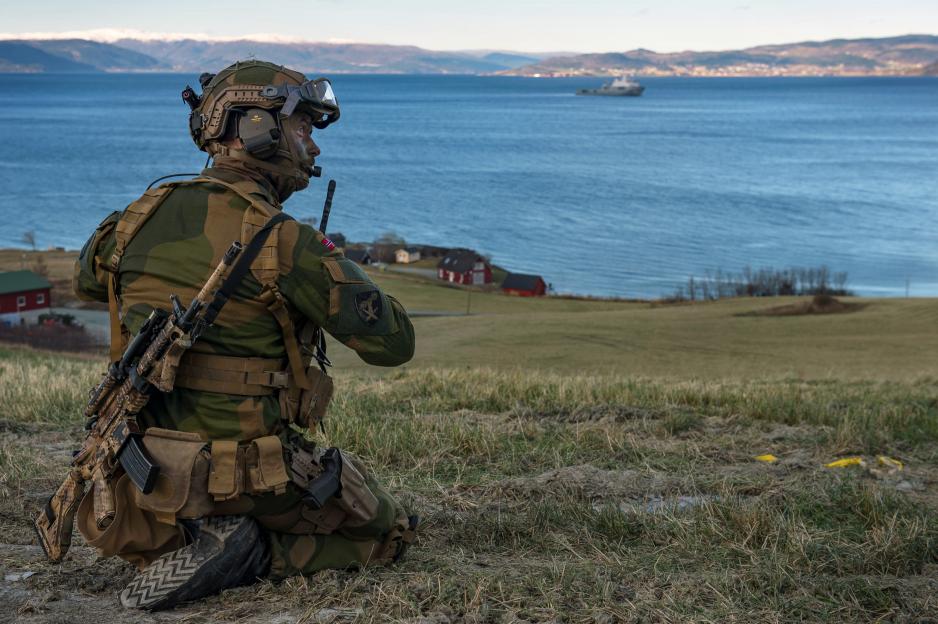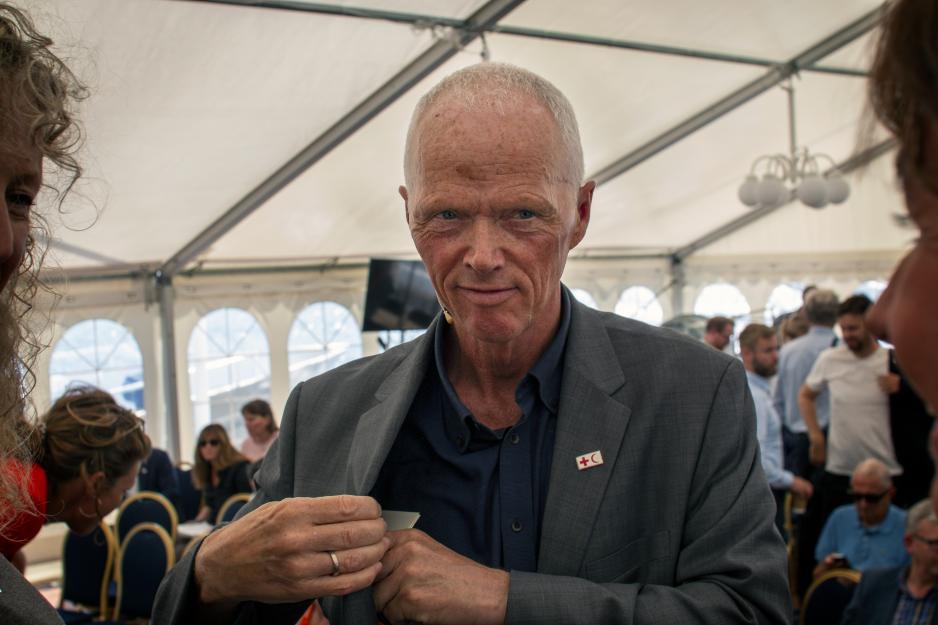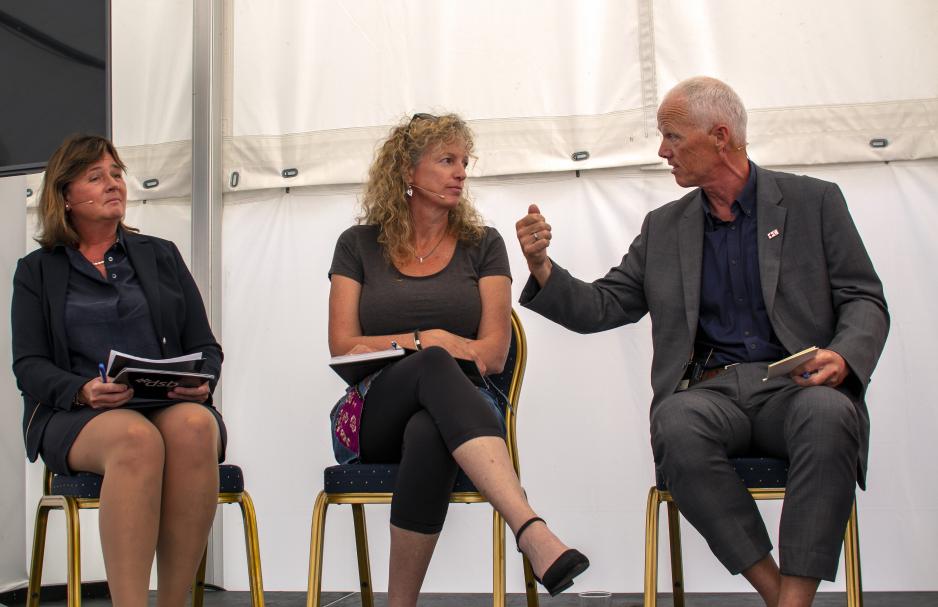Robert Mood on Norwegian Security: - Russian Intelligence Knows Our Weaknesses Better Than Most Members of Parliament

A Norwegian soldier during the NATO exercise Trident Juncture in Norway in the fall of 2018. (Photo: Marc-André Gaudreault, JFC Brunssum Imagery)
If anyone wanted to exploit Norway’s weaknesses in critical infrastructure next week, it would be very easy to do so, says retired Lieutenant-General Robert Mood. He argues that Russian intelligence has far more knowledge about Norway’s weaknesses than do most members of Parliament.
ARENDAL: - When we say that Norway has a strong defense and that we have systems and protection mechanism that are robust enough, we should not for a second believe that we are fooling anyone around us into believing that we have more than what we have. Those who are interested in watching us do by and large know the state of affairs, Mood says in an interview with High North News.
The retired Lieutenant-General from the Norwegian forces, with his background as head of the army, the 6th division and the Telemark Battalion is the current president of the Norwegian Red Cross.
After his retiring three years ago, he has become an active and at times critical voice in the debate about how the defense of Norway has developed over the past few years.
Mood a.o. received the Freedom of Speech Award from the Fritt Ord [‘Free Word’] Association in 2016 for “having demonstrated major courage of opinion in critical debates about the Defense’s role in society”.

Robert Mood participated in a debate about the total defense in the High North during the Arendal Week 2019. (Photo: Amund Trellevik)
I am fully convinced that Russian intelligence is putting together an image of our weaknesses and systemizes this.
Mood, who during the Arendal Week participated in a debate about the state of affairs for the total defense of Norway, argues that the country’s politicians should stop pretending Norway has a military structure different from what it in reality is.
- The most important thing for Norway when we discuss the overall preparedness, which I believe to be a better word, is first of all to acknowledge where we are. Investments are coming up and long-term plans have been made. But if anything were to happen next week, if someone wanted to mercilessly exploit our weaknesses, then that would be easy – and we have plenty of weaknesses. We must acknowledge where we are at and take a stand on whether to have an independent capacity of military significance or not, he says.
- Puts together an image of weaknesses
Before an Arendal crowd holding an interest in defense, Mood argued that Moscow has a far better overview over critical infrastructure in Norway than does the Norwegian parliament, Stortinget – and that Russia thus knows how to simply make Norway go blank in a crisis situation.
Mood expands his arguments to High North News:
- These are highly skilled intelligence communities, both when we talk about Moscow as well as allied capitals. These communities work intensely to locate weaknesses, though not in the Norwegian defense. They know the Norwegian defense very well and are not much impressed with it. But they are looking for flaws in other parts of our infrastructure. I am fully convinced that Russian intelligence is putting together an image of our weaknesses and systemizes this, and that the overall impression they hold is far better than that of most of the MP’s at Stortinget, Mood says.
He stresses that some of the parliamentary committees are better informed than others, but that the majority of the MP’s nevertheless only receive information in the case of an emergency.
Warns about dependency on the USA
He argues that Norway’s total dependency on NATO and the USA may be what potentially draws Norway into a larger conflict.
Mood warns against believing that deterrence will work against Russia, and refers to hybrid scenarios becoming more relevant to large-scale scenarios than deterrence may appear to be.
- It is interesting that Russia, which holds far less military capacity than the USA and NATO, has not been deterred from using small green men on the Crimea, or from running proxy operations in the Middle East. They key point is that even when the overall deterrence works, and even when we are 100 percent dependent on the USA and NATO and trust that NATO’s article 5 will kick in, it will make the space for operating in modern hybrid scenarios more relevant. We have seen both in the Ukraine and the Middle East that there are no limits to what one can do there on a tactical level.
- You are basically warning Norway against Russia?
- I do not walk around fearing Russia. I belong to those who praise good neighborly relations, with the Svalbard Treaty and the liberation of eastern Finnmark in 1944. I like to remind people that Norway is the only neighbor with which Russia has never been at war. Russia has been existentially threatened twice, by France and Germany. And papers published in the USA now demonstrate that there were more to the promises Gorbachev claimed to have received in 1991 following the breakdown of the Soviet Union, about NATO and the EU not expanding eastwards into the power vacuum, than what western politicians have admitted until now, Mood says and adds:
- I argue that we must understand that the world looks different from Moscow. We must understand that there are many good reasons why the collective mood, both in leadership and other parts of society, is the way it is right now.

Robert Mood debating the total defense in the North with Cecilie Daae (left), Director of the Directorate of Public Safety and Preparedness, and Gunhild Hoogensen Gjørv, Professor at UiT Norway’s Arctic University. (Photo: Amund Trellevik)
We should turn the entire mentality upside down and say that “the High North” is our most precious possession.
- What kind of challenges does Norway face in the north when we talk about Russia?
- Having a good, open dialogue and cooperation, lowering one’s shoulders and working on issues such as resources, trade, search and rescue at sea with a civilian profile. There will of course be tensions too, as the international situation is what it is. Nevertheless, we must manage to do both, Mood says and adds:
- It is fully possible to argue that the region from Bodø to Kirkenes is the future of Norway and Europe when it comes to resources, strategic importance, trade routes and a lot more. The High North should not be something we think of only when we have to. We should turn the entire mentality upside down and say that “the High North” is our most precious possession.
- Is Norway able to defend itself if it so wishes?
- No, of course not.
- But what if there were political will and money for that purpose?
- We can, if we dare challenge established truths and structures that are there today more for nostalgic reasons rather than their being future oriented, get very much more from our money than we do today. I am thinking more specifically about how our land defense is designed, how command structures are connected and how we build our special forces. Though keep in mind, it has been ten years since I was in working with the defense. So I will leave it for the Chief of the Defense to have a strong opinion on that.
- The topic of the debate you participated in was if we have control over the High North. Do we?
- The answer will of course be no if we understand this to mean whether or not Norway is able to decide what goes on and how big powers are to act in the Arctic. We have fairly good control when we take cooperation with the USA and NATO into account, if we understand this to mean that we then have an overview over what goes on.
- Is not that a kind of control?
- Well, yes, but it depends on how you define control. If you by control mean that Norway should be able to put an end to any activity we do not approve of, then of course we are not in control. However, if you perceive control to mean that Norway and Norwegian decisions will provide some conditions for how Russia, China and the USA will act in a situation of crisis in the High North, then the answer is no, of course.
This article was originally published in Norwegian and has been translated by HNN's Elisabeth Bergquist.

